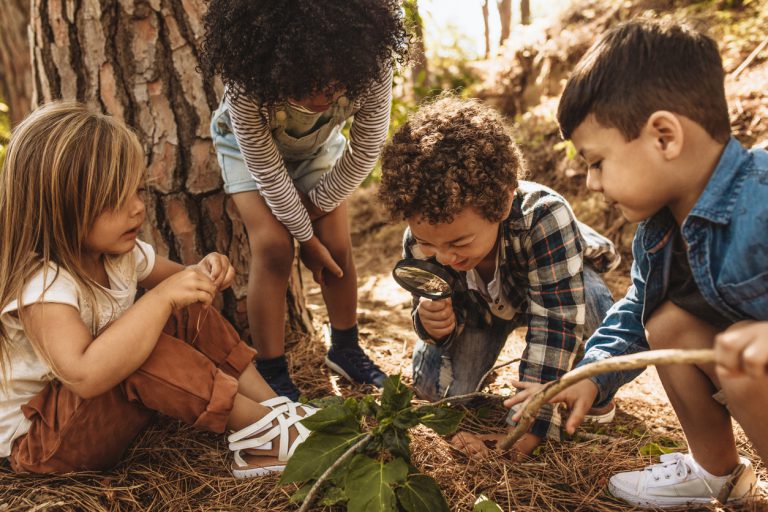By Jeannie Evans & Janelle Balarashti, Early Care & Education Team, The Family Conservancy
Originally published in the Summer 2020 Issue of Kansas Child Magazine
As we face this time of uncertainty during the COVID-19 pandemic, it is even more critical that we make sure our children are spending extra time outdoors. Not only does it help relieve stress and anxiety by reducing levels of cortisol in the brain, but a “recent U.K. study found that just 5 minutes of exercise in a natural outdoor environment can rapidly improve self-esteem and mental health in young people.”
Here are just a few of the key benefits of outdoor play:
1. Our bodies thrive on sunshine! Healthy doses of sunshine support the immune system, improve mood and aid in promoting healthy sleep. An added bonus while enjoying time in the sunshine is the reduced risk of near-sightedness that can occur from too much up-close screen time. The eye is allowed to see more into distances.
2. Outdoor play encourages a greater variety of movement that generally allows for enhanced activity, including quick reaction time and more vigorous movements. Children are allowed to think more creatively about how to move their bodies, heightening their sense of how a body moves in space! Children are more apt to use those “brain building” movements that are conducive to increasing brain synapses, such as spinning and crossing the midline.
3. Being outside improves children’s social skills. Not only does outdoor play give children a chance to move, but it allows them to learn problem-solving skills, how to cooperate and compromise as they make up new games, and how to interact within large and small groups of players. New vocabulary is developed by connecting the actual objects to words giving them more meaning. What does a habitat mean and how does it look different for different creatures? Being outside in nature increases those opportunities for the kind of hands-on learning experiences that a child can relate to in real life. What exactly is “fungi,’’and what is “squishy,” “mossy,” “muddy,” “rough” and “soft?” What happens when I add more water to the sand or dirt? The list goes on and on.
4. Trying new things helps make us brave! By going outside and exploring the effects of risk versus danger, children are able to learn what their bodies are truly capable of and heighten their self-esteem and self-confidence.
5. Our mental health gets a boost! Experiencing nature or green space on a regular basis increases a child’s ability to deal with stress, focus on a task, and might reduce a child’s risk of hyperactivity.
If a child grows up never digging in the soil, playing in a stream, walking in the woods and seeing animals in their natural habitat or watching a sunset, they have no way of knowing all that we would lose without nature. Ask yourself: Who benefits most from experiencing time spent outdoors and in nature?
What do YOU do now? Put aside the children’s schoolwork, put down the tablets, and go outside with the children. Now is YOUR time to improve your children’s overall health for today and for their future.
-

Child Care Aware of Kansas
Child Care Aware of Kansas connects everyone with a stake in child care — parents, child care providers, businesses, local and state leaders, and community members — to the information and ideas they need to take action. We provide opportunities, connections, and support for Kansans to envision what a better child care system can look like for them. Working within a network of Child Care Resource & Referral agencies, we also connect caregivers and providers to the information and support they need.






